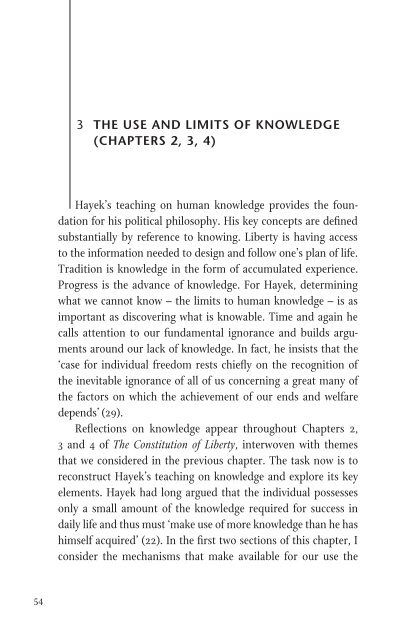Hayek's The Constitution of Liberty - Institute of Economic Affairs
Hayek's The Constitution of Liberty - Institute of Economic Affairs
Hayek's The Constitution of Liberty - Institute of Economic Affairs
You also want an ePaper? Increase the reach of your titles
YUMPU automatically turns print PDFs into web optimized ePapers that Google loves.
t h e u s e a n d l i m i t s o f k n o w l e d g e<br />
3 THE USE AND LIMITS OF KNOWLEDGE<br />
(CHAPTERS 2, 3, 4)<br />
Hayek’s teaching on human knowledge provides the foundation<br />
for his political philosophy. His key concepts are defined<br />
substantially by reference to knowing. <strong>Liberty</strong> is having access<br />
to the information needed to design and follow one’s plan <strong>of</strong> life.<br />
Tradition is knowledge in the form <strong>of</strong> accumulated experience.<br />
Progress is the advance <strong>of</strong> knowledge. For Hayek, determining<br />
what we cannot know – the limits to human knowledge – is as<br />
important as discovering what is knowable. Time and again he<br />
calls attention to our fundamental ignorance and builds arguments<br />
around our lack <strong>of</strong> knowledge. In fact, he insists that the<br />
‘case for individual freedom rests chiefly on the recognition <strong>of</strong><br />
the inevitable ignorance <strong>of</strong> all <strong>of</strong> us concerning a great many <strong>of</strong><br />
the factors on which the achievement <strong>of</strong> our ends and welfare<br />
depends’ (29).<br />
Reflections on knowledge appear throughout Chapters 2,<br />
3 and 4 <strong>of</strong> <strong>The</strong> <strong>Constitution</strong> <strong>of</strong> <strong>Liberty</strong>, interwoven with themes<br />
that we considered in the previous chapter. <strong>The</strong> task now is to<br />
reconstruct Hayek’s teaching on knowledge and explore its key<br />
elements. Hayek had long argued that the individual possesses<br />
only a small amount <strong>of</strong> the knowledge required for success in<br />
daily life and thus must ‘make use <strong>of</strong> more knowledge than he has<br />
himself acquired’ (22). In the first two sections <strong>of</strong> this chapter, I<br />
consider the mechanisms that make available for our use the<br />
knowledge possessed by others. Our using others’ knowledge<br />
is possible because individuals participate in an order that they<br />
did not create and whose ultimate workings they cannot understand.<br />
Thus in the third section I examine Hayek’s discussion <strong>of</strong><br />
order – how it originates and works to our advantage. <strong>The</strong> fourth<br />
section explores Hayek’s account <strong>of</strong> reason and shows how it rests<br />
on his evolutionary conception <strong>of</strong> mind. <strong>The</strong> concluding sections<br />
consider how knowledge is embodied in traditions, values and<br />
moral rules.<br />
Using inherited knowledge: rules and traditions<br />
What specific mechanisms make it possible for us to use the<br />
knowledge <strong>of</strong> others? Hayek makes a start on identifying these<br />
mechanisms near the beginning <strong>of</strong> Chapter 2, where he distinguishes<br />
between 1) ‘the transmission in time <strong>of</strong> our accumulated<br />
stock <strong>of</strong> knowledge,’ and 2) ‘the communication among contemporaries<br />
<strong>of</strong> information on which they base their action’ (27).<br />
<strong>The</strong> difference, viewed from the actor’s standpoint, is this: past<br />
know ledge becomes available for use largely by our conforming to<br />
rules, while we make use <strong>of</strong> contemporaneous knowledge largely<br />
by responding to signs.<br />
In the West particularly, the advance <strong>of</strong> science is a<br />
conspicu ous and vital way in which knowledge is transmitted<br />
through time; but from the standpoint <strong>of</strong> man’s evolution, the<br />
transmission <strong>of</strong> various tools, customs and institutions has been<br />
much more important. All these examples involve a compliance<br />
with rules. Hayek insists that rule-governed behaviour long<br />
preceded the use <strong>of</strong> reason and language, so it need not be deliberate<br />
or even something <strong>of</strong> which one is conscious. For a very long<br />
54<br />
55












